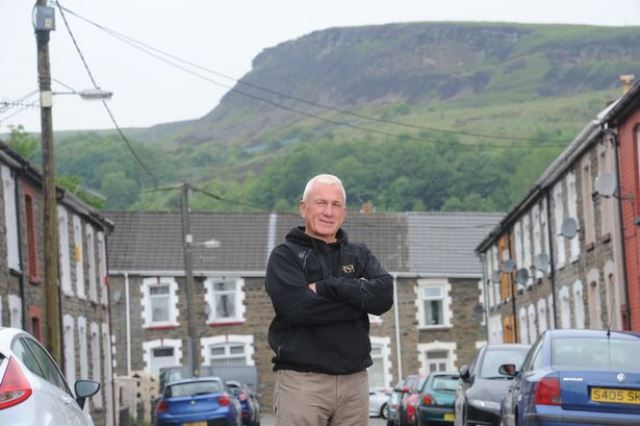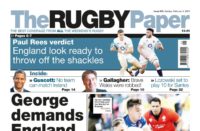Back in the day when the hatchet men ruled the roost in both football codes, Chris Jones ran a reign of terror in the name of a rugby club in the Rhondda.
Liverpool had Tommy Smith, a defender of such granite quality that Bill Shankly swore he had been ‘quarried' not born. Ron ‘Chopper' Harris of Chelsea and Norman ‘Bites Yer Legs' Hunter at Leeds completed a trio of hard nuts at a time when the French had cornered that particular market in rugby.
Their monopoly disappeared once Jones got to work for Treorchy over 12 riotous seasons from the early Eighties. He was the ultimate Hatchet Man, the only one who used to tuck an axe into his kitbag ‘in case things got out of hand'.
Describing Jones the prop as a tearaway would have been an understatement to those on the receiving end. “I wouldn't disagree with that, on and off the field,'' he said. “I had a terrible reputation. People used to call me a psychopath.
“My life became crazy. I got sent off so often I lost count. I was banned for life twice. I got involved in the drugs scene, a bit of marijuana and magic mushrooms, just to have a good time.''
The road to Damascus moment saved Jones from total self-destruction and changed his life beyond recognition. The profound nature of his redemption can be measured in what he said at the start of our conversation, an expression of concern for humanity provoked by the coronavirus pandemic.
“Why don't they call for a national day of prayer?'' he said. “My father was at Dunkirk and the king then called for prayers. As Christians we believe in God's capacity for intervention. If others don't believe in that, that's their choice.
“One death is horrendous, never mind thousands. People are in a state of fear and confusion. I believe a national day of prayer would help to unite those of all faiths in such tough times.''
Jones will be 62 next month and this year brings the 30th anniversary of his conversion as a born-again Christian. It happened not at a Billy Graham crusade but in a cell at Brecon police station during a Saturday night in high summer at the town's annual jazz festival.
“I was accused, wrongly, of stabbing an undercover drugs officer and of violent disorder,'' he said. “I felt frightened and ashamed. I was in a place that so many people, like my parents and teachers, warned I would end up in unless I changed my ways.
“I was facing a jail sentence for something I didn't do. I paced around the cell for hours thinking: ‘How do I get out of this?' I got to the point where I said: ‘God help me'.
“Then I thought: ‘I don't believe in God'. Well, sometimes I did and sometimes I didn't. I also thought: ‘If there is a God, why would He want to help someone like me?'
“Then I said: ‘God, if you are there, I am really sorry. I don't want to go on living like this. I've been an awful husband to my wife and three children. I want to change, to make a fresh start.
“I didn't have my hands together in prayer but I made a commitment there and then to go His way. I wasn't sure then what that meant but it felt good, right and clean.
“There was no choir of angels, no blinding light but that night, in the police cell, I began to change. It wasn't more than the tiniest of sparks. On the Monday I appeared at the Magistrates Court handcuffed to a policeman who said they were going to take me to Swansea gaol on remand.
“They gave me conditional bail instead. I went home and saw a vicar who lived round the corner, explained to him what had happened and he invited me to come to church.
“He gave me a bible and asked that I read the gospel stories and find out about Jesus. I quickly learnt there was much more to Jesus than an image on a Christmas card, that I could talk to God like you are talking to me.
“Later on, the inspiration I had from the Christians in Sport movement was massive, from the organisation in general and one player in particular, the All Black Inga Tuigamala.
“I met him in Cardiff when the All Blacks were there in 1991. There was a scrum of kids surrounding him for his autograph but I got close enough to thank him for inspiring me. He insisted I went back to the team hotel for a chat about his faith.
“I remember him saying he had never been in a fight on a rugby field. I felt ashamed because I was fighting nearly every time I went onto a rugby field. I later found that Inga even had a bible in Wigan's physio room at Central Park.
“I was lucky, too, to know a pastor who became a great friend, John Bullock at the Gatehouse Church Elim Pentecostal in Porth, my home town. At the start he said: ‘Rugby is not the problem, Chris. You are the problem'.”
Jones has long stopped coaching at Pontypridd but he is still putting boys on the assembly line for Wales as the Rhondda schools' rugby development officer, his passion for the game undimmed but strictly controlled.
Six have gone on to play for their country: Matthew Rees, Morgan Stoddart, Andrew Bishop, Lou Reed, Rhys Gill, Tomos Williams. A seventh, WillGriff John, would have done but for the coronavirus.
There was a time when good judges reckoned Jones would play for Wales. “Why did rugby make me so angry?'' he asks. “Maybe not achieving what some people thought I would achieve had something to do with it.
“But even if I'd had 50 caps for Wales, it still couldn't compare with what I've got now: a personal relationship with Jesus Christ, an inner peace and a bright hope for the future.
“And, as a fitness fanatic, I haven't had one drop of alcohol since that day in Brecon 30 years ago…''
Who knows, maybe someone somewhere in the church hierarchy will pick up his idea of a national day of prayer and run with it.

























